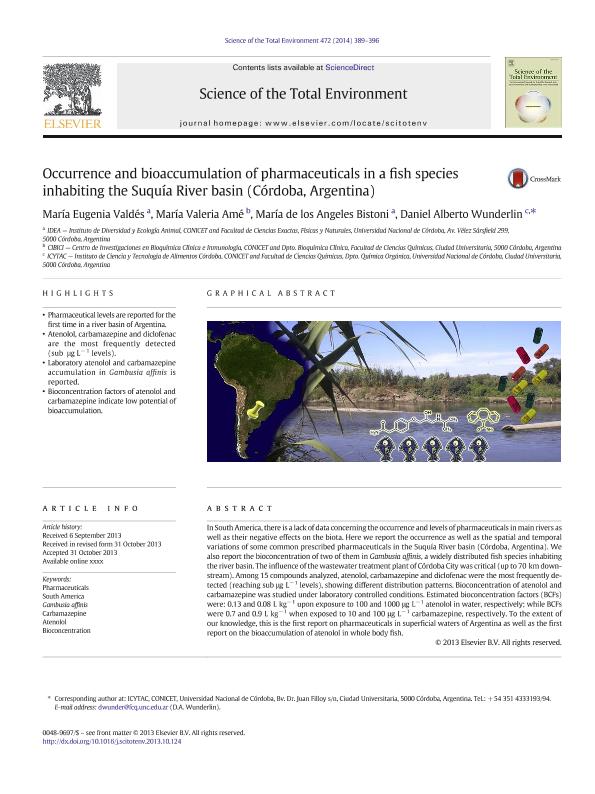Mostrar el registro sencillo del ítem
dc.contributor.author
Valdés, María Eugenia

dc.contributor.author
Amé, María Valeria

dc.contributor.author
Bistoni, María de los Angeles
dc.contributor.author
Wunderlin, Daniel Alberto

dc.date.available
2016-11-04T22:12:14Z
dc.date.issued
2014-02
dc.identifier.citation
Valdés, María Eugenia; Amé, María Valeria; Bistoni, María de los Angeles; Wunderlin, Daniel Alberto; Occurrence and bioaccumulation of pharmaceuticals in a fish species inhabiting the Suquía River basin (Córdoba, Argentina); Elsevier Science; Science Of The Total Environment; 472; 2-2014; 389-396
dc.identifier.issn
0048-9697
dc.identifier.uri
http://hdl.handle.net/11336/8011
dc.description.abstract
In SouthAmerica, there is a lack of data concerning the occurrence and levels of pharmaceuticals inmain rivers as well as their negative effects on the biota. Here we report the occurrence as well as the spatial and temporal variations of some common prescribed pharmaceuticals in the Suquía River basin (Córdoba, Argentina). We also report the bioconcentration of two of them in Gambusia affinis, a widely distributed fish species inhabiting the river basin. The influence of the wastewater treatment plant of Córdoba Citywas critical (up to 70 km downstream). Among 15 compounds analyzed, atenolol, carbamazepine and diclofenac were the most frequently detected (reaching sub μg L−1 levels), showing different distribution patterns. Bioconcentration of atenolol and carbamazepine was studied under laboratory controlled conditions. Estimated bioconcentration factors (BCFs) were: 0.13 and 0.08 L kg−1 upon exposure to 100 and 1000 μg L−1 atenolol in water, respectively; while BCFs were 0.7 and 0.9 L kg−1 when exposed to 10 and 100 μg L−1 carbamazepine, respectively. To the extent of our knowledge, this is the first report on pharmaceuticals in superficial waters of Argentina as well as the first<br />report on the bioaccumulation of atenolol in whole body fish.
dc.format
application/pdf
dc.language.iso
eng
dc.publisher
Elsevier Science

dc.rights
info:eu-repo/semantics/openAccess
dc.rights.uri
https://creativecommons.org/licenses/by-nc-nd/2.5/ar/
dc.subject
Pharmaceuticals
dc.subject
South America
dc.subject
Gambusia Affinis
dc.subject
Carbamazepine
dc.subject
Atenolol
dc.subject
Bioconcentration
dc.subject.classification
Oceanografía, Hidrología, Recursos Hídricos

dc.subject.classification
Ciencias de la Tierra y relacionadas con el Medio Ambiente

dc.subject.classification
CIENCIAS NATURALES Y EXACTAS

dc.title
Occurrence and bioaccumulation of pharmaceuticals in a fish species inhabiting the Suquía River basin (Córdoba, Argentina)
dc.type
info:eu-repo/semantics/article
dc.type
info:ar-repo/semantics/artículo
dc.type
info:eu-repo/semantics/publishedVersion
dc.date.updated
2016-11-02T18:13:39Z
dc.journal.volume
472
dc.journal.pagination
389-396
dc.journal.pais
Países Bajos

dc.journal.ciudad
Amsterdam
dc.description.fil
Fil: Valdés, María Eugenia. Consejo Nacional de Investigaciones Cientificas y Tecnicas. Centro Cientifico Tecnologico Cordoba. Instituto de Diversidad y Ecologia Animal; Argentina
dc.description.fil
Fil: Amé, María Valeria. Consejo Nacional de Investigaciones Científicas y Técnicas. Centro Científico Tecnológico Córdoba. Centro de Investigaciones en Bioquímica Clínica e Inmunología; Argentina
dc.description.fil
Fil: Bistoni, María de los Angeles. Consejo Nacional de Investigaciones Cientificas y Tecnicas. Centro Cientifico Tecnologico Cordoba. Instituto de Diversidad y Ecologia Animal; Argentina
dc.description.fil
Fil: Wunderlin, Daniel Alberto. Consejo Nacional de Investigaciones Científicas y Técnicas. Centro Científico Tecnológico Córdoba. Instituto de Ciencia y Tecnología de Alimentos Córdoba; Argentina
dc.journal.title
Science Of The Total Environment

dc.relation.alternativeid
info:eu-repo/semantics/altIdentifier/url/http://dx.doi.org/10.1016/j.scitotenv.2013.10.124
dc.relation.alternativeid
info:eu-repo/semantics/altIdentifier/url/http://www.sciencedirect.com/science/article/pii/S0048969713013004
Archivos asociados
